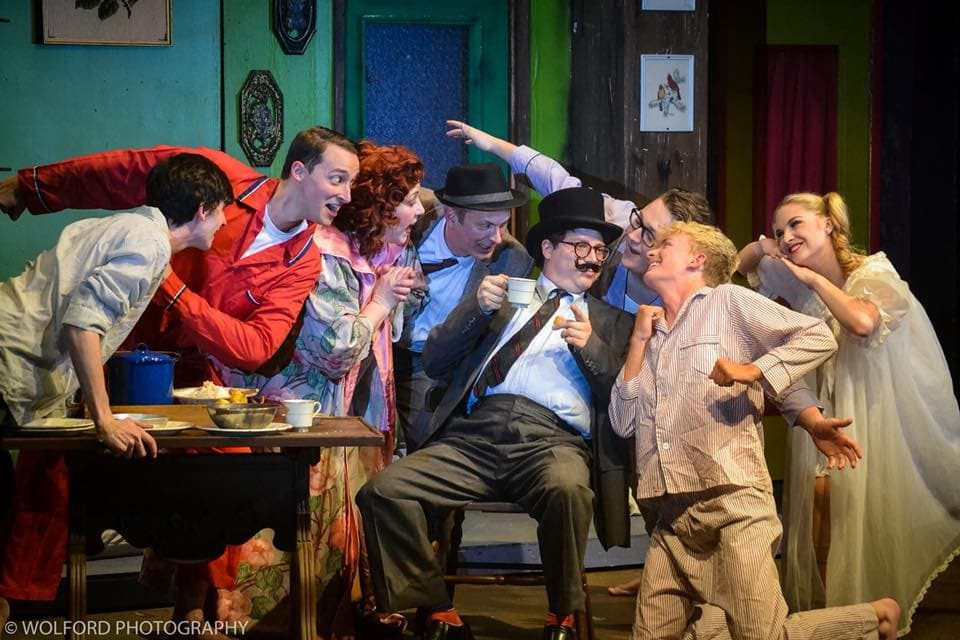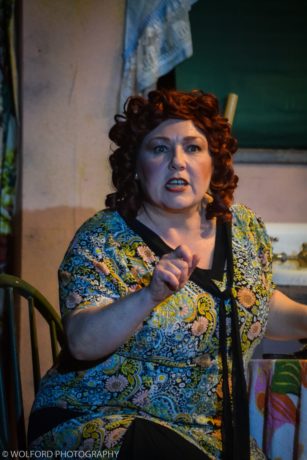The original full title of the show now playing at the Cumberland Theatre was Gypsy: A Musical Fable. Emphasize that final word. Gypsy Rose Lee was none too particular about the facts of her life in the 1957 memoir on which the show was based; telling a good story easily trumped telling a true story. The show’s creative team — Arthur Laurents, Jule Styne, and Stephen Sondheim – took further dramatic license. The result was far from a biography (Karen Abbott’s American Rose is a good telling of the historical Lee’s life), but stands near the top of the list of classic Broadway musicals.

The key to the success of any production is its lead character, in this case Rose Hovick, a dramatically and musically challenging role that Bernadette Peters once described as “King Lear with music.” Originated by Ethel Merman, the role has been played by an all-star roster of singer/actors, including Peters, Patti LuPone, Angela Lansbury, Tyne Daly, Roz Russell, and Bette Midler, among others. Notorious as the archetypical overbearing stage mother, Gypsy’s version of the character is actually less colorful than the historical Rose, who was suspected (though not charged) in two murders and reportedly had a number of female as well as male lovers. Arthur Laurents recounted that he became really interested in writing the play following a cocktail party conversation with one of the former.
Cumberland’s Rose, Nicole Halmos, gave a solid, competent performance, striking the right notes of Rose’s energy, single-minded determination to overcome all obstacles, neediness, fear of abandonment, and aggression, though without the edgy dynamism that can make the character truly frightening. Actors and commentators have long disagreed on whether or not Rose should be portrayed as a monster; Halmos appears to come down on the non-monstrous side of this unresolvable debate. Nor does Halmos exhibit the strong belt voice so useful in many of Rose’s numbers, such as “Some People.” Her most successful musical moments were the quieter ones, like “Small World” and “You’ll Never Get Away from Me.”

A couple examples of how this plays out: The brilliantly written final scene of Act 1 presents a dramatically stunning contrast between Rose’s up-tempo, uplifting, I’m-gonna-make-you-a-star ”Everything’s Coming Up Roses” and the heartbreak of her daughter, Louise, who desperately longs to leave the chaotic life of a collapsing vaudeville act for the stability of a real home. Less fierce, and less belted, than some renditions, the song does not produce the devastating effect that the scene sometimes can. Halmos addresses several portions of the song directly to Louise, a defensible choice that nevertheless defangs the point that Rose is singing more about herself than Louise. In her soliloquy at the end of Act 2, “Rose’s Turn,” Halmos gives Rose an overdue moment of self-awareness – her ambition and manipulation have pushed everyone away — but short of the “nervous breakdown set to music” that LuPone saw in the number.
Like all actors playing Louise/Gypsy, Kimberly Camacho faces the challenge of transforming from a shy, awkward teenager to an accomplished, confident show business celebrity, all within a few scenes in the second act. Her physicality as Louise relies on slumped-forward shoulders and a deer-in-the-headlights expression, which she gradually loses as Gypsy’s confidence increases through the iterations of the strip version of “Let Me Entertain You” in Act 2. She sings the wistful “Little Lamb” sweetly in Act 1; one might wish for more commanding vocals as Gypsy becomes a star. Her nonverbal reactions to Tulsa during “All I Need is the Girl” were an acting highlight.
Rose’s beta-male lover and booking agent, Herbie, is a character who can easily get overlooked. Ken Griggs does not let this happen. Griggs brings an Alan Alda-like vibe to a warm, humorous, assured take on Herbie, making his presence felt in his kindness to the young people in the troupe as well as his devotion to Rose and Louise. In his powerful final scene with Rose, Herbie shows himself to be as resolute as she is. Griggs is probably the best Herbie I’ve ever seen.
The production showcases a number of strong featured performances. Karen Hutcheson, Emily Haworth, and especially Johanna Leary shine as the three strippers in the always-hilarious “You Gotta Get a Gimmick.” As Tulsa, Kole Mitchell McKinley moves fluidly in his song-and-dance number, “All I Need is the Girl.” As Baby June, Sissy Sheridan displays both the triple-threat talent of her over-the-top child star character and a hint of the steel in the character that will later lead her to take charge of her life (the historical June grew up to have a long and successful stage and screen career as June Havoc). Alexis Krey shows the maturing of the teenage June’s strength, as well as her bitterness, particularly in her duet with Louise, “If Momma Was Married,” delivering a real sting with the line “And I’ll gladly give her away.” Mr. Grantzinger’s secretary was a nice character bit, played by Carrie Wolford Watson. The younger and older versions of the kids in Rose’s act moved and sang well and in character, as well doing nicely in their spoken character bits.
The set was basically a double proscenium, with red curtains across each arch and movable set pieces to represent various rooms in which action took place. The show is accompanied only by piano and percussion, understandable given space limitations, but leaving the score sounding rather monochromatic. There were occasional balance issues between piano and singers. The lighting was serviceable, often relying on follow spots; there was a persistent cold spot downstage left. There was also a missed opportunity during “Gimmick,” when lowering the main stage lights would have highlighted Electra’s costume lights, which became fully visible only briefly as she exited. The varied costumes were attractive and (with the glaring exception of an Army green uniform for one of the boys several decades in the future from the 1920s) period-appropriate. Rose’s costumes were fittingly dowdy, though for some reason her makeup left her face looking pasty white for much of the evening. Gypsy’s rapidly changing gowns during her transition to stardom in Act 2 were outstanding, and the choice to have Louise wear the lower end of the cow costume during “All I Need is the Girl” was inspired.
Running Time: Two hours and 55 minutes, including one intermission.
Gypsy plays through May 27, 2018, at the Cumberland Theatre, 101 Johnson St., Cumberland MD. For tickets, please call 301-759-4990 or go online.




